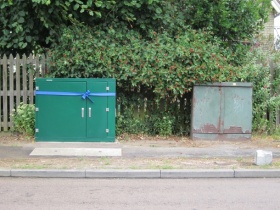Grass-roots broadband derailed by commercial push


Local broadband campaigners have responded angrily to Lancaster City Council's decision to withdraw a funding bid for cheap, community-run broadband connectivity in favour of a county-wide project that will require a commercial ISP partner.

Campaigners are unhappy with the prospect of slower fibre-to-the-cabinet broadband. Photo credit: David Meyer
The city council had initially given its support to a pilot scheme, based upon a Lancaster University-sponsored ISP, that would have provided Abbeystead, Arkholme, Melling, Wennington, Wray and Caton with fibre-to-the-home broadband for just £92 per year. However, the city council withdrew its support for the plan on 2 February, after Lancashire County Council said it was in talks with commercial partners for a county-wide scheme.
"Since the initial project was developed, Lancashire County Council has announced its own intentions to lead a wider broadband project with the intention of improving broadband provision across the whole county," a spokeswoman for Lancaster City Council said in a statement on Tuesday.
According to local broadband campaigner Chris Conder, the county-wide scheme will probably lead to the involvement of BT and its fibre-to-the-cabinet technology. She said this would mean a slower and more expensive service than promised by the local fibre-to-the-home alternative, along with the installation of too many broadband cabinets.
Lancaster City Council had applied for £750,000 of Rural Development Programme England (RDPE) funding for the local project, but Lancashire County Council then revealed its wider scheme, for which it was seeking £20m in North West Regional Development Agency (NWRDA) funding. On 2 February, the city council decided to shelve its own bid in order to protect itself from "long-term risk", despite its misgivings over the county-wide project.
The city council's own decision paper (PDF) noted that the county-wide scheme carried the disadvantages of "no confirmation yet of coverage, speed of service, timescales or extent of engagement".
According to Conder, the local scheme "didn't get through the final rubber-stamping because it got caught up in politics".
"People shouldn't just settle for cabinets; they should have the final solution, which is fibre-to-the-home for an affordable price," Conder said. "Our scheme would provide a 1Gbps fibre pair to a community for them to use however they like for £92 per year, whereas we're paying £14,000 per year in the village just to transit from our village to the nearest town. That's without any backhaul. That's the difference between a community network and a telco network."
Campaigners have not given up hope that the project could go ahead with alternative funding, but concede that it could take much longer to reach their objectives.
"All we're bothered about is getting this prototype up and running... It's going to happen anyway, but it'll take us years to do it," Conder said. "It's such a brilliant plan. This one plan can jinx BT."
Get the latest technology news and analysis, blogs and reviews delivered directly to your inbox with ZDNet UK's newsletters.